The SSD Relapse: Understanding and Choosing the Best SSD
by Anand Lal Shimpi on August 30, 2009 12:00 AM EST- Posted in
- Storage
What's Wrong with Samsung?
The largest SSD maker in the world is Samsung. Samsung makes the drives offered by Apple in its entire MacBook/MacBook Pro lineup. Samsung makes the drives you get if you order a Lenovo X300. In fact, if you're buying any major OEM system with an SSD in it, Samsung makes that drive.
It's just too bad that those drives aren’t very good.
This is the 4KB random write performance of Samsung's latest SSD, based on the RBB controller:
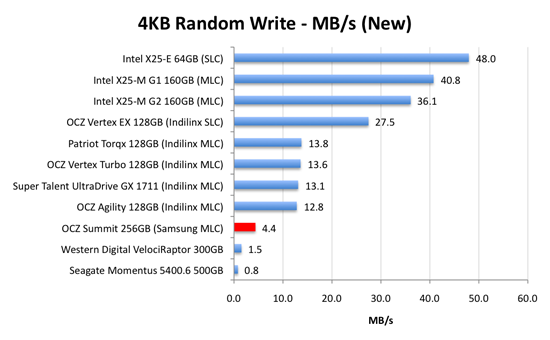
4.4MB/s. That's 3x the speed of a VelociRaptor, but 1/3 the speed of a cheaper Indilinx drive.
Speedy, but not earth shattering. Now let's look at performance once every LBA has been written to. This is the worst case scenario performance we've been testing for the past year:
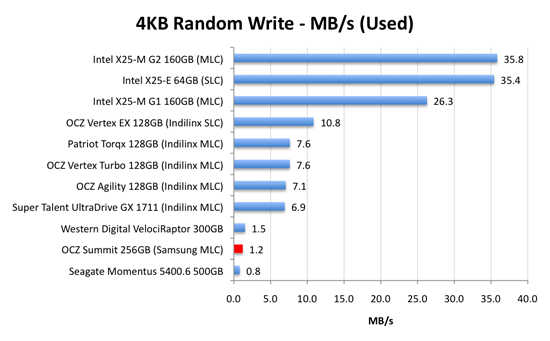
...and now we're down to mechanical hard drive speeds
Holycrapwtfbbq? Terrible.
Now to be fair to Samsung, this isn’t JMicron-terrible performance. It’s just not worth the money performance.
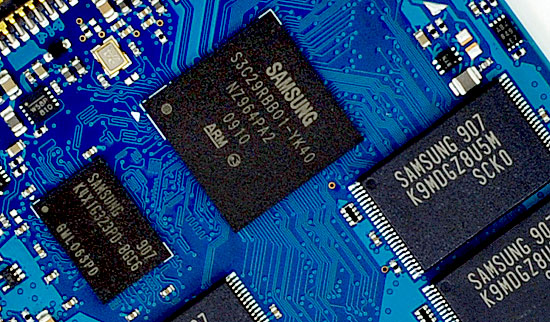
The Samsung RBB based SSDs are rebranded by at least two manufacturers: OCZ and Corsair.
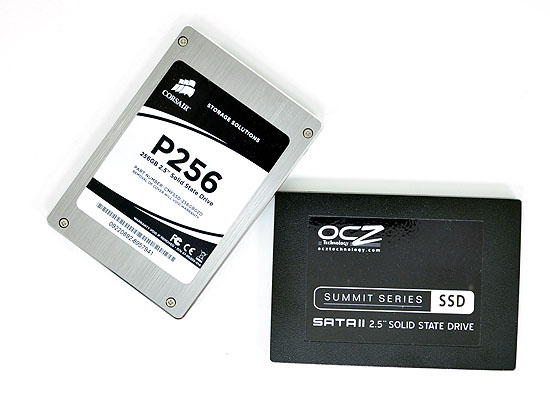
The OCZ Summit and the Corsair P256 both use the Samsung RBB platform.
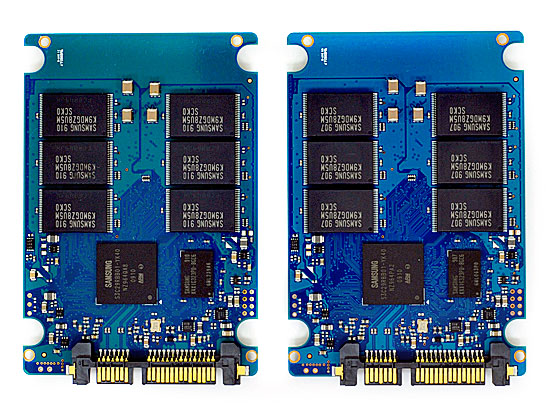
The Corsair and OCZ Samsung RBB drives.
The drive most OEMs are now shipping is an even older, lower performing Samsung SSD based on an older controller.
I talked to some of the vendors who ship Samsung RBB based SSDs and got some sales data. They simply can’t give these drives away. The Indilinx based drives outsell those based on the Samsung RBB controller by over 40:1. If end users are smart enough to choose Indilinx and Intel, why aren't companies like Apple and Lenovo?
Don't ever opt for the SSD upgrade from any of these OEMs if you've got the option of buying your own Indilinx or Intel drive and swapping it in there. If you don't know how, post in our forums; someone will help you out.
Samsung realized it had an issue with its used-state performance and was actually the first to introduce background garbage collection; official TRIM support will be coming later. Great right? Not exactly.
There’s currently no way for an end user to flash the firmware on any of these Samsung drives. To make matters worse, there’s no way for companies like OCZ or Corsair to upgrade the firmware on these drives either. If you want a new firmware on the drive, it has to go back to Samsung. I can’t even begin to point out how ridiculous this is.
If you’re lucky enough to get one of the Samsung drives with background garbage collection, then the performance drop I talked about above doesn’t really matter. How can you tell? Open up Device Manager, go to your SSD properties, then details, then select Hardware Ids from the dropdown. Your firmware version will be listed at the end of your hardware id string:
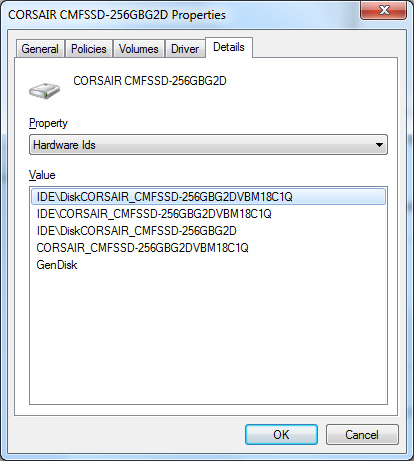
Version 1801Q doesn’t support BGC. Version 18C1Q (or later) does.
How can you ensure you get a model with the right firmware revision? Pick a religion and start praying, because that’s the best you can do.
Now the good news. When brand new, the Samsung drives actually boast competitive sequential write, sequential read and random write speeds.
These drives are also highly compatible and very well tested. For all of the major OEMs to use them they have to be. It’s their random write performance that’s most disappointing. TRIM support is coming later this year and it will help keep the drives performing fresh, but even then they are still slower than the Indilinx alternatives.
There’s no wiper tool and there’s currently no method to deploy end-user flashable firmware updates. Even with TRIM coming down the road, the Samsung drives just don’t make sense.










295 Comments
View All Comments
Abjuk - Wednesday, September 2, 2009 - link
Agreed CM, my current project at work takes about six minutes to build from scratch and CPU usage never gets above about 35%. The process is totally IO bound.It really depends on whether you have several large source files or several hundred small ones.
Weyzer - Tuesday, September 1, 2009 - link
Good article and testing, but why was the Crucial M225 not mentioned at all? It's performance is similar to the vertex drives, I know, but I think it could have been mentioned somewhere, if it is in the good or bad range.jasperjones - Tuesday, September 1, 2009 - link
javascript:link('frmText') $997 @ Newegg omgomgomgNeedless to say, that price will come down quickly. So more seriously, after reading the article I really feel I understand better what to look for in an SSD. Thanks!
paesan - Tuesday, September 1, 2009 - link
Wow, does NE really think that anyone will buy the Intel drive at that price. OMG!!! Funny thing, it is in stock and it says limit 1 per customer. LolCList - Tuesday, September 1, 2009 - link
Obviously someone is buying them at that price or they'd lower it. The people who can't wait two or three weeks and are willing to be gouged for these drives are the ones that allow NewEgg to give us low margins on other products while not going out of business :Dravaneli - Tuesday, September 1, 2009 - link
I just decided to buy one and when I opened newegg i couldn't believe my eyes. I hope that is only because they have a few drives left, and once Intel pumps up some stock in the retailers the prices will go back to Intel's retail.Does anyone know what are the production capabilities of Intel's SSD factories? I don't want to wait a whole year until the market saturates.
LazierSaid - Tuesday, September 1, 2009 - link
This article was so good that Newegg doubled their X25M G2 prices overnight.medi01 - Tuesday, September 1, 2009 - link
Yep, very impressive advertisement indeed.HVAC - Tuesday, September 1, 2009 - link
I'd rather have ewoks in the sequels than Jar-jar ...Naccah - Tuesday, September 1, 2009 - link
Newegg's prices on all the Intel SSDs skyrocketed. The X-25 G2s are $499 now. Is this price a reflection of the high demand or did Intel change the price again?